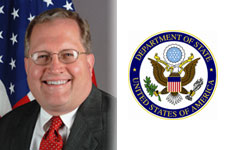Cybersecurity
-
The militarization of cyberspace and cybersecurity is making some folks a little queasy.
June 14, 2010 -
The Sec Tech \'10 conference will cover everything from cyberthreats to workplace violence. Duke Rollins from host ADT joins us with details.
June 14, 2010 -
A hacker group that calls itself Goatse Security said it got the site to cough up more than 114,000 e-mail addresses by guessing which codes would be valid.
June 14, 2010 -
Learn more in today\'s cybersecurity update.
June 11, 2010 -
How can the federal government attract the best and the brightest workers to develop the strongest cyber workforce on the planet? Hint: it\'s not just about hiring those with computer skills. We get details about a recent report from Booz Allen Hamilton and the Partnership for Public Service.
June 11, 2010 -
Grid Reliability clears the House, Botnet taken down by owner
June 11, 2010 -
Senate leaders pledge to pass a comprehensive cybersecurity bill this year. Sen. Lieberman promises a hearing and markup of the legislation before the end of June. Industry experts are concerned over the role DHS will play in regulating critical infrastructure.
June 11, 2010 -
Learn more in today\'s cybersecurity update.
June 10, 2010 -
Sens. Lieberman, Collins and Carper\'s legislation creates two new offices to oversee federal cybersecurity in DHS and the White House. It also forms a new Federal Information Security Taskforce made up of agency chief information security officers. Bill does not include \"kill switch\" provision for private sector networks.
June 10, 2010 -
Bill would put DHS in charge of all civilian networks
June 10, 2010 -
Learn more in today\'s cybersecurity update.
June 09, 2010 -
After Google hack, warnings pop up in SEC filings
June 09, 2010 -
The challenge of securing the nation\'s IT infrastructure has often been likened to building an airplane as it flies through the air -- or even herding cats.
June 08, 2010 -
This week, Federal Security Spotlight talks with John Streufert of the State Department. June 10, 2010
June 08, 2010




